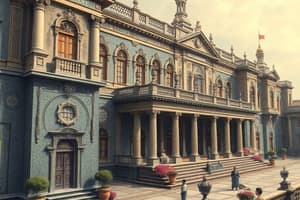Podcast
Questions and Answers
Which political ideology rejects the concept of government and advocates for a society based on voluntary cooperation and direct democracy?
Which political ideology rejects the concept of government and advocates for a society based on voluntary cooperation and direct democracy?
- Anarchism (correct)
- Socialism
- Conservatism
- Liberalism
What does conservatism emphasize the importance of preserving?
What does conservatism emphasize the importance of preserving?
- Revolution
- Status quo (correct)
- Anarchy
- Change
Which system aims to create a more equal society through collective or government ownership of the means of production and distribution?
Which system aims to create a more equal society through collective or government ownership of the means of production and distribution?
- Fascism
- Anarchism
- Socialism (correct)
- Capitalism
What essential skill can students gain through undergraduate research opportunities in political science?
What essential skill can students gain through undergraduate research opportunities in political science?
What type of political system does anarchism advocate for?
What type of political system does anarchism advocate for?
What is a defining characteristic of democracy?
What is a defining characteristic of democracy?
In which government system does power get distributed between a central government and regional governments?
In which government system does power get distributed between a central government and regional governments?
Which political theory emphasizes individual rights, limited government, and civil liberties?
Which political theory emphasizes individual rights, limited government, and civil liberties?
What is a key feature of Authoritarianism?
What is a key feature of Authoritarianism?
Which government system involves a loose alliance of self-governing political entities?
Which government system involves a loose alliance of self-governing political entities?
Flashcards are hidden until you start studying
Study Notes
Exploring Government Systems and Political Theory
Political science encompasses a multi-faceted discipline that examines the inner workings of societies, with a focus on government systems and the development of political theory. This article will delve into these core aspects, drawing from recent research and educational perspectives.
Government Systems
At the foundation of political science is the study of government systems, which involve the distribution of power and the interaction between government, citizens, and interest groups. Traditional models include:
- Democracy: Government by the people, often involving elections, representation, and the protection of individual rights.
- Authoritarianism: Government by a single leader or a small group, with limited or no elections and tight control over society.
- Federalism: A system that allocates power between a central government and regional or state governments.
- Confederalism: A loose alliance of self-governing political entities that agree to cooperate on specific issues.
Political Theory
Political theory delves into the philosophical foundations of politics, addressing fundamental questions about the nature of the state, power, justice, and democracy. Pivotal theories include:
- Liberalism: Focuses on individual rights, limited government, and the protection of civil liberties.
- Conservatism: Values tradition, stability, and order, and emphasizes the importance of institutions and the need to preserve the status quo.
- Socialism: A system that aims to create a more equal society through collective or government ownership of the means of production and distribution.
- Anarchism: Rejects the concept of government and advocates for a society based on voluntary cooperation, decentralization, and direct democracy.
Research Opportunities
Undergraduate research opportunities in political science are plentiful, providing valuable insights into the field. From serving as a research assistant to working on independent research projects, students gain hands-on experience and develop essential skills, such as:
- Critical thinking
- Problem-solving
- Qualitative and quantitative data analysis
- Collaboration and communication
Educational Benefits
Incorporating political science into an academic curriculum provides numerous benefits, including:
- Enhancing students' understanding of government systems
- Cultivating analytical and critical thinking skills
- Developing a global perspective and appreciation for diverse political systems
- Preparing students for careers in law, politics, and public policy
In conclusion, the interdisciplinary nature of political science allows scholars to explore the intricate relationships between government systems and political theory. By engaging in research and learning from diverse perspectives, students and professionals alike can deepen their understanding of the field and make meaningful contributions to society.
Studying That Suits You
Use AI to generate personalized quizzes and flashcards to suit your learning preferences.




